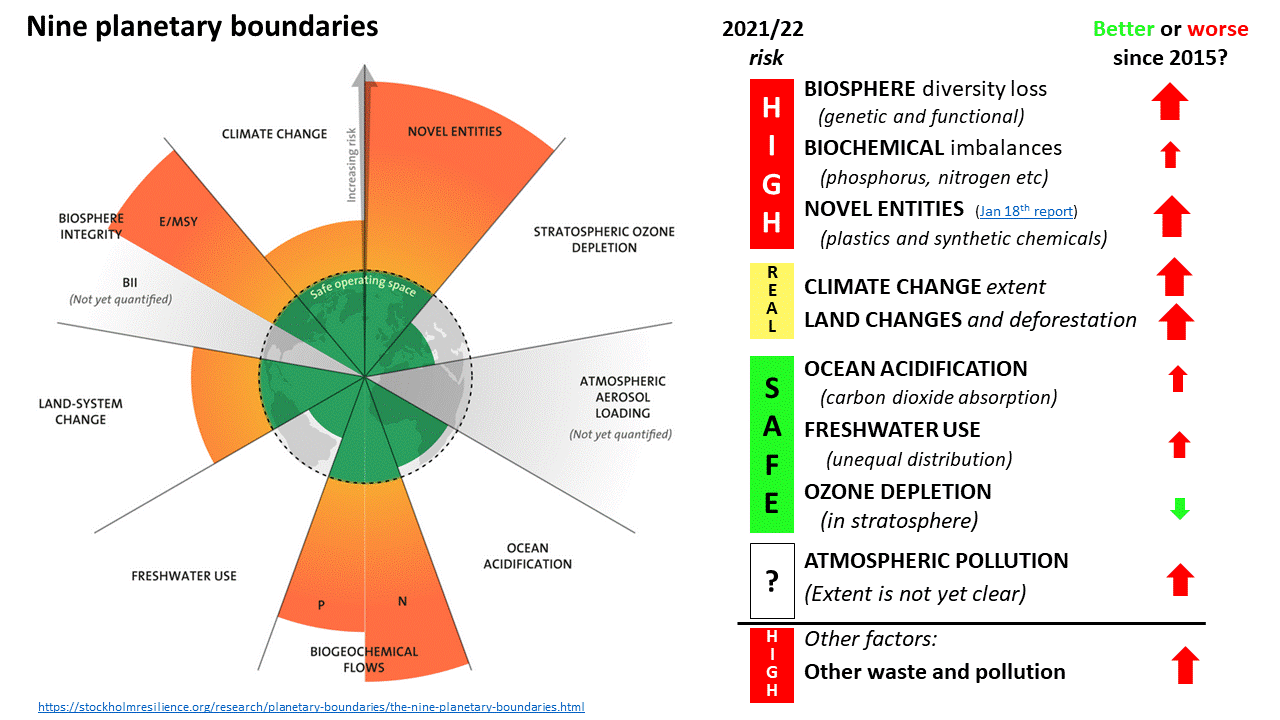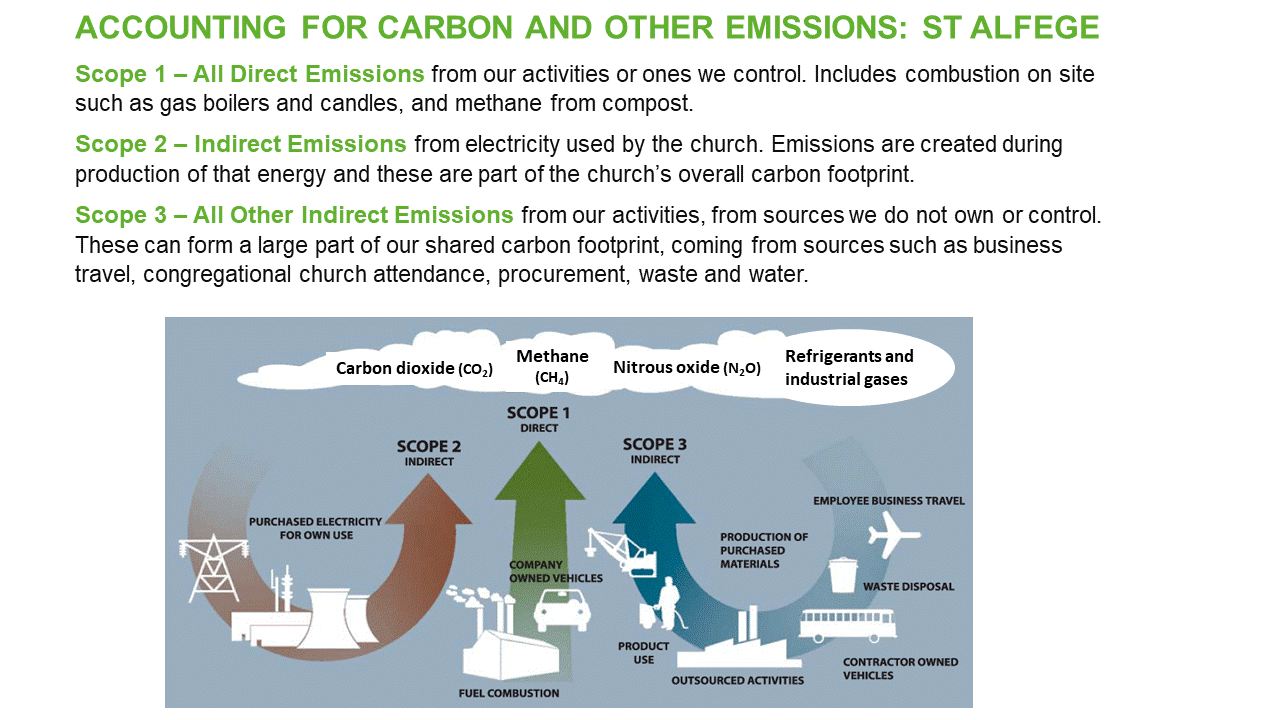Workshop report
A. Introduction
We had a challenging talk followed by questions and then two more detailed discussion sessions. These notes are a short summary of the main points that came up at each stage of the Workshop.
There were also two short polls, one taken at the beginning and one at the end of the Workshop. Results of these are presented in an Appendix at the end of this write up.
B. Robin Stott talk and discussion
Robin outlined nine planetary boundaries that we need to be in good shape if we want to preserve our planet in anything like its present form. Problems with Land Use, for example, include deforestation, over-fertilisation (nitrogen and phosphorus), over-use of land, soil loss and salination, and excess herbicide and insecticide use. Other problems include high levels of plastic waste and microplastics.

The principal victims of climate change are countries and people in the developing world, who do the least to create the problem. This is highly unjust.
To respond positively, we need to change our mindsets to see ourselves as a part of nature. In harming the planet, we harm ourselves. Reconnecting with nature helps us re-set our attitudes. Guided walks through nature are one way to do this.
How do we measure our carbon footprint? As individuals, there are various tools we can use on line [see the Resources section on the website]. In general, we need to include carbon emissions from at least three different sources: Scope 1: Direct – what we ourselves emit from our own activities, such as heating; Scope 2: Indirect – carbon emitted in generating the electricity and other energy we use; and Scope 3: Other’s Indirect – the carbon from other people’s activities that goes into supporting our activities, including what we buy and dispose of. These three scopes also provide a framework for how we can track emissions for an organisation like St Alfege.

The average carbon footprint for an individual in the UK depends on how you measure it. Carbon dioxide emission per person is quoted as 9-10 tons in the UK, on average, but depends what is included. For example, the UK excludes measurements of exported carbon (the carbon dioxide created abroad making goods for us to buy and use in the UK), and also those from shipping, aviation, and train travel – amongst other things. In the EU the total average figure is between 13 and 14 tons.
Robin talked about some of the steps he has taken to reduce his carbon footprint. He challenged us to think creatively and make tackling climate change a priority, through actions such as:
-
Tree planting and providing support for this in other countries (via charities such as Tree Aid)
-
Reducing our energy consumption via measures such as insulation, draught proofing, green roofs, solar water heating etc
-
Buying less, buying second-hand and changing our diets
-
Taking political action – vote only for those with ‘green’ priorities, tackle food waste across the system
-
Engaging with younger people, who are the future – bringing them into leadership groups to educate us on their views and support them better (‘reverse mentoring’)
-
Bringing organisations together – challenge to church to respond at a national and local level
Book recommendation:
The Entangled Life by Merlin Sheldrake: fungi are key to both life and recycling.
QUESTIONS:
What are individual carbon dioxide footprints in other nations?
The USA and Australia are higher than us, more like 25 tons on average. The United Arab Emirates is 40 tons. In contrast, Tanzania and most African countries are more like 0.5 tons. The sustainable limit is 1.5 tons or less per person.
How do we promote awareness of climate change and Integrate it into our lives? How do we encourage one another?
Look for opportunities to learn, talk, and take action with others.
One-third of the world’s agricultural land is only fit for grazing. How do we manage this sustainably?
Agriculture is complicated but some things are clear. We need to stop cutting down rainforests to grow soya and grain to feed to animals. We must also deal with high levels of food wastage (about 25% of overall food production intended for human consumption goes to waste).
People aren’t changing their behaviour but are acting as if nothing needs to be done. Isn’t what we do just a waste of time?
A substantial number of people are making a difference already. It does take time but attitudes are changing. You have to start by knowing why you want to act – what you want to save and make better for the future. And we need to share more of the good news stories. Acting together is much more powerful and sustaining than acting alone.
C. Breakout 1 – How do we feel? Three groups looking at the same questions:
1. Immediate feelings?
Feeling overwhelmed
Sense of frustration:
-
more questions than answers
-
people’s behaviour not changing
-
profligacy of other nations
2. Encouraged by?
-
Connectedness and relatedness – other people are on this journey too, and it is easier to take action alongside others doing something similar
-
Energy and commitment of young people
-
Practical pointers – we can make a difference as individuals and as a church
-
Being here with others in this workshop
-
Helpful to have concrete targets we can work towards
-
Taking action helps us feel empowered and challenges our feelings of being overwhelmed
-
Not being judgemental of others
-
“Act because you want the world to be a beautiful place”
IDEAS:
-
Growing communal food in shared spaces
-
Encouraging young people into leadership and involvement – including decisions on what we do and what we spend money on
-
Look for ways to promote awareness, engage people and encourage behavioural change
D. Breakout 2 – Three different topics and one general question
1. LIFESTYLE
PRINCIPLES:
-
‘How we act is how we are seen’: leadership and role modelling
-
Focus on what we have enthusiasm and passion for
-
Look for opportunities to connect and unite people around a common cause/activity
-
Being open will help people understand what the church is about
-
Examine how we live our lives in this context of shared responsibility – for our world, our community, and our individual discipleship
IDEAS:
-
Encourage each other to connect with nature – the importance of gardening
-
Create safe and welcoming places to nurture mental health in the context of the natural world
-
Explore use of St Alfege Park for nature connectedness, especially with young people
-
Map what is happening locally, eg gardening groups (Ashburnham, Christchurch, Sitopia)
-
Promote individual and group examples of positive changes, eg reduced car use
-
Seek commitment from a group of people to make lifestyle changes and feed back on progress, to encourage wider change
-
Support the charity Tree Aid in planting trees in Africa
ISSUES:
-
Finding effective ways to encourage people to change
2. LAND
PRINCIPLES:
-
Encourage biodiversity
-
Encourage re-wilding
-
Build awareness of our environment
-
Involve Children’s Church families/teenagers
-
Involve the congregation
-
Build links to the community
-
Start close to home, move out into the community
IDEAS:
-
Tree planting in churchyard and St Alfege Park
-
Planting wild flowers and putting in winding paths through wild areas
-
Set aside and protect an area as a nature haven
-
Use of Children’s Church artwork outside in the churchyard
-
Guided nature walks for the congregation, to reconnect with nature
-
Put green roofs on buildings
-
Set a percentage target for nature/rewilding
-
Hold a ‘Green’ market at the church twice a year
-
Hold regular events to help people identify their carbon footprint
-
Set collective targets for lifestyle changes, share ideas and encourage others
ISSUES:
-
Noted previous opposition to some suggestions, including tree planting, bee hives etc
-
Need for consultation, to take the views of others in the local community into account and involve them where possible, including local MP and Greenwich Council
-
Learn from our and other’s experiences to avoid known problems
3. COMMUNITY AND GLOBAL ENGAGEMENT
PRINCIPLES:
-
Connect to local young people
-
Build links into the local community
-
Make connections with the wider diocese
-
Keep looking to the future
IDEAS:
-
Make connections in deanery, diocese
-
Identify allies in the local community
-
Facilitate individual lobbying on related causes (eg Greenpeace, insecticides etc)
-
Work with St Alfege school to reduce food waste
ISSUES:
-
Explore potentially contentious ideas, such as ground source heat pumps, solar panels on the church roof
4. WHERE ON THE CHURCH’S AGENDA SHOULD CLIMATE/ ENVIRONMENTAL ISSUES BE?
PRINCIPLES:
-
Should be at the top of our agenda
-
Get the church talking about this together: engage and connect people
-
Find ways to inform and educate ourselves and others
-
Build awareness of our environment
-
In our decision making, balance financial sustainability with the need to look to the future
IDEAS:
-
Sermons, guest speakers in services and other meetings
-
Discussions and sharing information over coffee after church
-
Regular feedback on how we are doing
E. Plenary
We came back together to share what we had talked about in our three separate groups. These points are captured above. Other issues that came up were:
-
It is difficult to engage people and it is even more difficult for us and others to change. The problem feels enormous and makes us feel powerless. How do we tackle inertia and encourage change?
-
It is essential to communicate honestly with each other about what we are feeling, accepting where each of us are and not judging what others are doing. We need to talk both about the big picture and also about how it applies to everyday things. We will be more motivated and effective if we act together as a community.
-
We are a diverse community. We need to recognise difference and positively engage with issues of equality, diversity and inclusion.
-
Personal contacts and invitations are what draws people in. To build an active and creating community, we need to have the courage to speak to and invite in people we don’t know, and to involve those we know less well.
-
We also talked briefly about what we do next. Actions include:
-
Write up and share the content of this Workshop
-
Put more information on resources onto the church website, including articles and links on emotional and mental health and wellbeing
-
Develop plans for progressing our Eco Church Award status and provide feedback on this on the church’s website